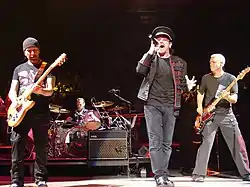
Alternative Airplay is a record chart published by the music industry magazine Billboard that ranks the most-played songs on American modern rock radio stations. Introduced by Billboard in September 1988 and named Modern Rock Tracks until June 2009,[1] it was initially compiled based on weighted reports from several national rock radio stations.[2] Starting with the chart dated June 12, 1993, radio airplay data compiled by Nielsen Broadcast Data Systems – which electronically monitors various radio stations on a daily basis – was introduced as a factor in determining chart rankings.[3] Modern Rock Tracks later became solely based on Nielsen data, a change that took effect with the chart dated January 22, 1994.[3]
145 songs topped the Modern Rock Tracks chart in the 1990s; the first of these was "Blues from a Gun" by The Jesus and Mary Chain, which spent three weeks at number one from December 1989 to January 1990.[4] The modern rock radio format experienced a substantial growth in popularity during the decade,[5] with the success of Nirvana's 1991 song "Smells Like Teen Spirit" marking a "return of the crossover rock hit".[6] Speaking to Billboard in 1994, chart analyst Max Tolkoff remarked that in previous years, "people didn't care what was a hit on modern rock. Now everybody wants to be involved."[6] The first formal number one debut on the Modern Rock Tracks chart also occurred during the 1990s, with "What's the Frequency, Kenneth?" by R.E.M. entering at number one on the chart for the issue dated September 24, 1994.[7]
The Irish band U2 scored the most number-one hits on Modern Rock Tracks during the decade, with six of their songs topping the chart: "The Fly", "Mysterious Ways", "One", "Hold Me, Thrill Me, Kiss Me, Kill Me", "Discothèque" and "Staring at the Sun".[4][8] "Scar Tissue" by the American band Red Hot Chili Peppers topped the chart for sixteen consecutive weeks in 1999, the longest time spent at number one by any song during the 1990s.[9] The band themselves spent a record twenty-seven weeks at number one on Modern Rock Tracks during the decade with four chart-toppers: "Give It Away", "Soul to Squeeze", "My Friends" and "Scar Tissue".[4][10] "All the Small Things" by Blink-182 was the final Modern Rock Tracks number-one hit of the decade.[4]
Number-one songs
- Key
- † – Billboard year-end number-one song[lower-alpha 1]
- ↑ – Return of a song to number one
| Contents |
|---|
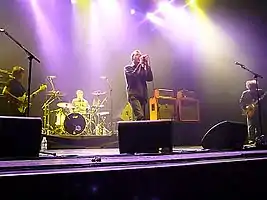

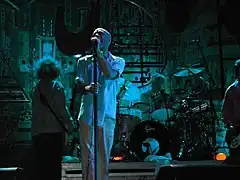
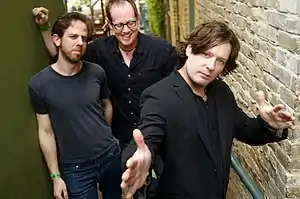

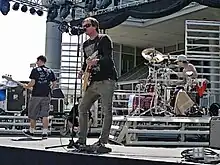
Notes
- ↑ The Modern Rock Tracks year-end number-one song of 1994 was "Black Hole Sun" by Soundgarden,[11] which peaked at number two on the chart dated July 2.[12]
References
- ↑ Molanphy, Chris (April 19, 2012). "100 & Single: Gotye And fun. Help Alternative Rock Go Pop Once Again". The Village Voice. Retrieved June 15, 2013.
- ↑ Cateforis 2011, p. 65.
- 1 2 Whitburn 2008, p. 8.
- 1 2 3 4 5 6 Whitburn 2008, pp. 342–349.
- ↑ Keith & Sterling 2008, p. 165.
- 1 2 Boehlert, Eric (April 9, 1994). "Modern Rock Comes Into Its Own". Billboard. Vol. 106, no. 15. p. 69. Retrieved June 15, 2013.
- ↑ "Powter Stays Hot, Chili Peppers Sizzle On Charts". Billboard. April 13, 2006. Retrieved June 27, 2013.
- ↑ "U2 Chart History (Alternative Airplay)". Billboard. Retrieved May 8, 2020.
- ↑ Trust, Gary (February 11, 2013). "Muse's 'Madness' Rewrites Record For Longest-Reigning Alternative Songs No. 1". Billboard. Retrieved June 15, 2013.
- ↑ "Red Hot Chili Peppers Chart History (Alternative Airplay)". Billboard. Retrieved May 8, 2020.
- ↑ "Hot Modern Rock Tracks". Billboard. Vol. 106, no. 52. December 24, 1994. p. YE-62. Retrieved May 8, 2020.
- ↑ "Modern Rock Tracks". Billboard. Vol. 106, no. 27. July 2, 1994. p. 102. Retrieved June 13, 2013.
- ↑ "Top Modern Rock Tracks" (PDF). Billboard. Vol. 102, no. 51. December 22, 1990. p. YE-47. Retrieved May 8, 2020.
- ↑ "Top Modern Rock Tracks" (PDF). Billboard. Vol. 103, no. 51. December 21, 1991. p. YE-41. Retrieved May 8, 2020.
- ↑ "Top Modern Rock Tracks" (PDF). Billboard. Vol. 104, no. 52. December 26, 1992. p. YE-42. Retrieved May 8, 2020.
- 1 2 "Top Modern Rock Tracks" (PDF). Billboard. Vol. 105, no. 52. December 25, 1993. p. YE-39. Retrieved May 8, 2020.
- ↑ "Hot Modern Rock Tracks". Billboard. Vol. 108, no. 1. January 6, 1996.
- ↑ "Hot Modern Rock Tracks". Billboard. Vol. 108, no. 52. December 28, 1996. p. YE-78. Retrieved May 8, 2020.
- 1 2 "Hot Modern Rock Tracks". Billboard. Vol. 109, no. 52. December 27, 1997. p. YE-73. Retrieved May 8, 2020.
- ↑ "Hot Modern Rock Tracks". Billboard. Vol. 110, no. 52. December 26, 1998. p. YE-84. Retrieved June 15, 2013.
- ↑ "Hot Modern Rock Tracks". Billboard. Vol. 111, no. 52. December 25, 1999. p. YE-90. Retrieved May 8, 2020.
Bibliography
- Cateforis, Theo (2011). Are We Not New Wave?: Modern Pop at the Turn of the 1980s. University of Michigan Press. ISBN 978-0-4720-3470-3.
- Keith, Michael C.; Sterling, Christopher H. (2008). Sounds of Change: A History of FM Broadcasting in America. University of North Carolina Press. ISBN 978-0-8078-5888-2.
- Whitburn, Joel (2008). Rock Tracks 1981–2008 (3rd ed.). Record Research. ISBN 978-0-8982-0174-1.